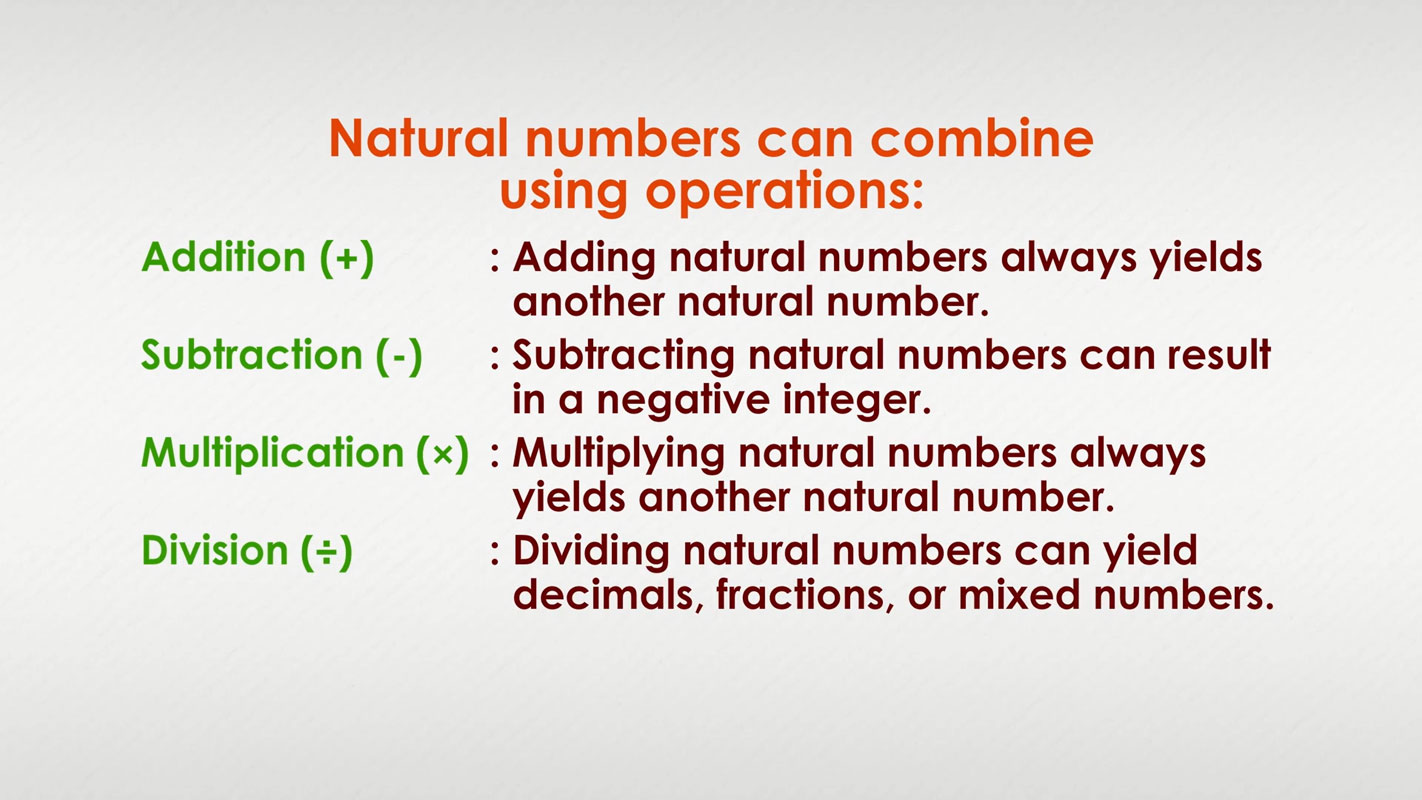Natural Numbers (Definition & Examples)
What are natural numbers?
In algebra, Natural numbers are defined as the counting numbers; positive integers beginning with 1 and increasing by 1 forever. Zero is not a natural number.
Another definition of natural numbers is whole, positive numbers. Natural numbers are never negative numbers or fractions, so not all rational numbers are natural numbers.

In math, the symbol for a set of natural numbers is N.

Set of natural numbers
When mathematicians describe a group or set of integers, they use brackets and ellipses like this: {...}.
The ellipsis means the set continues in either one or two directions, getting smaller or getting larger in a predictable way.
A set of natural numbers looks like this:
{1, 2, 3, 4, 5, 6, 7, 8, 9, 10, 11, 12, 13, 14...}
The first five natural numbers are 1, 2, 3, 4, 5. Notice the set begins with 1, not 0.

A set of natural numbers will always be a set of positive integers.
Look at your fingers. You can mentally count using the natural numbers to find you have (in most cases) eight fingers and two thumbs.
Feet? Two feet; ten toes. Hairs on your head? Well, that may take longer, but on average you will have 100,000 of those, from this part of the set of whole numbers:
{...99,996; 99,997; 99,998; 99,999; 100,000...}

Natural numbers are called “natural” because they are a natural way to count objects using one-to-one correspondence. We have one number for every object, no matter what we are counting, real or imagined.
Here are exactly nine countable examples:
Cupcakes to share
Books on your shelf
Ideas you thought of between 9:17 and 9:41
Atoms in your body
Grains of sand on the beach
Number of elements on the periodic table
Stars in our solar system
Galaxies in the universe
Atoms in all the stars of all the galaxies in the universe
In no case does the counting process of these items begin with 0, which is a problem.
Is 0 a natural number?
Most mathematicians, teachers, and professors consider 0 a whole number but not a natural number. Some, though, do consider 0 a natural number:
Its use in physics, for example, allows for the zeroth law of thermodynamics.
If you are uncertain how your textbook, teacher, or professor uses 0 (is it a whole number, a natural number, or something else?), ask.
For that class, course or textbook, go with what you are told but understand mathematics is often as much opinion as precision, so another course, textbook, or class could view 0 differently.
Combining natural numbers
Natural numbers can combine using operations:
Addition – Adding natural numbers always yields another natural number
Subtraction – Subtracting natural numbers can result in a negative integer
Multiplication – Multiplying natural numbers always yields another natural number
Division – Dividing natural numbers can yield decimals, fractions, or mixed numbers

Here are four examples to demonstrate these qualities:
2 + 7 = 9
7 - 2 = 5, but 2 - 7= -5
2 × 7 = 14
= 3.5 or
Natural number examples
Here are exactly eight challenges to see if you know your natural numbers:
Write the natural numbers ending at 11.
Is 100 a natural number?
If you count all the mathematics books on your bookshelves, will you get a natural number or something else?
Which of these is a natural number? -1, 0, 365
What natural number lies between 5.5 and 7.1?
What are the natural numbers greater than but less than ?
Is the answer to 4×9 a natural number?
Is the answer to 5-5 a natural number?
We know you naturally want to peek, but don't! Work these out first, then look at the answers below.
The natural numbers ending at 11 are {1, 2, 3, 4, 5, 6, 7, 8, 9, 10, 11}. Notice there is no ellipse since this is a finite set of real numbers.
The number 100 is a natural number.
The number of mathematics books on your bookshelves will be a natural number.
Only 365 is a natural number.
The natural number that lies between 5.5 and 6.8 is 6.
The natural numbers greater than but less than are {24, 25, 26, 27, 28, 29, 30}.
The answer, 36, is a natural number.
The answer, 0, is not usually considered a natural number.